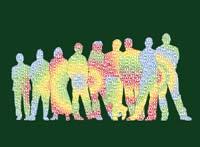The power of genes
2008/04/12 Galarraga Aiestaran, Ana - Elhuyar Zientzia

Some have come to believe that all characteristics, both physical and behavioral, depend on genes, which is known as genetic determinism. Genes, taken to the extreme, are gods for the faithful or stars for astrology followers for genetic determinists. They think it depends on genes what each person is and what they will be.
However, genes do not command as much. Genes are pieces of DNA that contain information to produce proteins, but being a gene to produce a certain protein does not mean, nor does it want or want, that that protein will form, which will give a characteristic to the person. In fact, there are many factors that influence the functioning of genes, many of them of environmental origin. Therefore, in creating a specific characteristic, external conditions, such as sun, food, education, can have the same or even more influence than genes.
In recent times, researchers have focused on it and clarified some myths or erroneous thoughts. For example, they have shown that genes do not determine sexual behavior at all. It is true that modifying a specific gene for fruit flies can alter their behavior. Somehow, they become bisexual: not only do they try to have sex with the other sex, but also with same-sex flies. Researchers found that they identified the gene for homosexuality.
However, with the gene change it was shown that fruit flies lost the ability to differentiate sex from their members. So they tried the same thing with each other. In people, however, sexual attraction is not just about odors. Or does anyone believe that yes, that the subject is so simple?
Cancer, for example

Cancer has often been considered a genetic disease, meaning that if you have a gene associated with cancer, you have every chance of developing this type of cancer. However, a study with one hundred thousand twins shows that the incidence of genes in cancer generation is very low, less than 10%.
However, in some types of cancer, the presence of a genetic variant associated with this cancer increases your risk of development. Breast cancer is 27% more likely to develop cancer than an associated gene, 35% more in colon cancer, and 42% more in prostate cancer. But the onset of the disease depends mostly on the factors around it: drinking alcohol, smoking, exposure to chemicals, nutrition, or certain infections.
Certainly, believing that the influence of genes is greater than it is or genetic determinism can be dangerous or harmful. For example, if a person knows in any way that he or she has a gene associated with a certain cancer, he or she may live in fear of cancer development, even if he or she really has little chance of developing.
Genetic determinism, dangerous

But believing in genetic determinism can be dangerous not only for oneself but for society. Statements by French President Nicolas Sarkozy in Philosophie magazine show the consequences of believing in genetic determinism. According to him, it is not about the creation of pedophiles or suicides. Therefore, the parents of 1,200-1,300 children who kill each year have no responsibility. He said no more, but it seems he meant that “He will still have less responsibility, so the government, right?
Sarkozy is not the only one with these consequences. The forensic chief of Scotland Yard believes it would be convenient to decode children's DNA with aggressive behaviors and save the information in a database. Thus, based on this information, there may be an opportunity to prevent future attacks. This issue has aroused great controversy in Britain, but the local police have the ability to collect the DNA sample of any detainee over ten years since 2004, for or against citizens.
On the contrary, most scientists say otherwise. In fact, according to recent studies, genes have a maximum incidence of 20% in the suicide trend and there is no gender related to the aggressive trend.
At the other end, the influence of genes on other characteristics or diseases has been observed. Some diseases are caused by specific mutations: Duchenne Muscular Dystrophy, Huntington Evil... In them, if in the DNA there is a genetic variant that produces the disease, sooner or later, it manifests itself.
To what extent do genes govern? Scientists are still completing the answer, but at least they have one clear thing: their authority is not total.
Published in Gara

Gai honi buruzko eduki gehiago
Elhuyarrek garatutako teknologia





